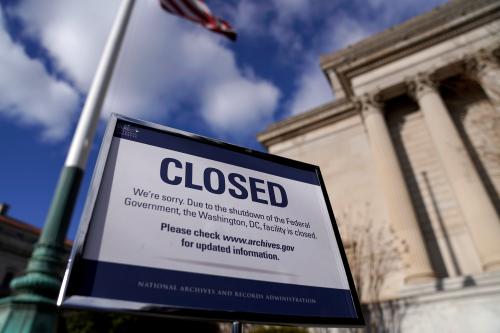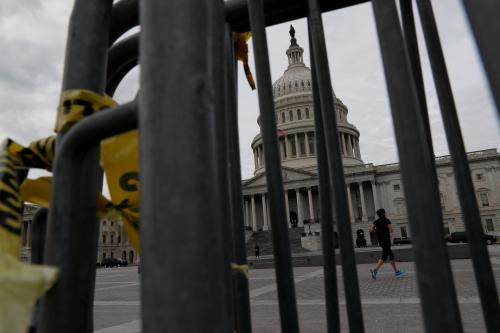A government job with its steady paycheck is supposed to be a ticket to the middle class. Yet 800,000 government workers just missed their first paycheck this weekend. During the last shutdown, two-thirds of government workers lacked savings to cover one pay period (two weeks) and this one is dragging on much longer. These workers are now entering a reality that has been increasingly affecting middle class families across America: severe income volatility.
Furloughed workers have already started taking steps all too common to families living paycheck to paycheck: curtailing spending, increasing credit card debt, delaying paying bills, and seeking short-term, small dollar credit. As these federal workers curtail spending—others are also impacted. Waiters are confronted with empty tables, taxi drivers with no fares, and service providers with skipped appointments—all seeing their wages fall unexpectedly. As the shutdown dominoes continue to fall, these negative volatility shocks spread.
Financial institutions are surprisingly ill equipped with reasonable products to help families handle short-term small-dollar credit needs. Families who overspend on their debit card are hit with a $35 overdraft fee—and this adds up. Americans overdraft to the tune of $24 billion a year. And those that need just a few hundred dollars to make it until the shutdown ends, will find that it can be more difficult to borrow $1000 to bridge this gap than it is to borrow $20,000 for a car. As a result, like 2.5 million households last year, they may choose to use a payday loan, often paying interest rates of 300-400 percent. Remember that everyone who uses a payday loan has a bank account, as a postdated check is collateral for the loan.
Entering this world may come as a shock to federal employees who are used to the stability of a government job. Stability that helps offset what are often lower wages than people realize: the average salary of a TSA inspector is $40,000. While Congress passed and the President signed legislation mandating back pay when the shutdown ends, that law is not putting anything into their bank accounts today. Furthermore, non-government workers who are directly impacted may never be made economically whole from the shutdown’s loss of economic activity.
This new reality for government workers highlights what is the norm for a growing number of middle class families.
This new reality for government workers highlights what is the norm for a growing number of middle class families. Sixty percent of workers in America are hourly employees and these hours are hardly constant—especially when business is slow. Research by the JP Morgan Chase Institute looked at 6 million of Chase’s customers and found that over the course of a year, “On average, individuals experienced a 40 percent change in total income on a month-to-month basis”. In fact, income stability was actually the rarity, as 13 out of 14 families had income fluctuations of 5 percent or more on a monthly basis.
There are many reasons why income varies: fewer hours due to scheduling or bad weather, alimony and child support checks that are late, and second or third jobs that are seasonal. Research from the Center for Financial Services Innovation found that “Families typically experienced almost three months when their incomes fell at least 25 percent below their average income.” As the gig economy and contingent work grows this trend will accelerate.
How to improve the lives of those dealing with income volatility? When the shutdown ends, federal workers need to receive their back pay as quickly as possible. Until then, it is good to see that some financial institutions have stepped up to help. Sandy Spring Bank, a Maryland bank, is offering a line of credit for up to $7,500 at 5.5 percent for 60 days to customers impacted by the shutdown. The U.S. Treasury Department Federal Credit Union will loan members their net pay for one or two pay periods at no cost for 30 days and 6 percent interest after that, as well as provide a 30-day grace period for existing loans upon request. More should follow suit. Each day matters, especially the first of the month when many fixed expenses are due.
More broadly, policy makers and the private sector need to adapt existing mindsets to the reality of income volatility. Ideas to allow workers faster access to earnings deserve more attention. Walmart and Uber are experimenting with this: after all why should I wait up to three weeks between working and being paid? Transitioning to a real-time payment system would make everyone’s funds available immediately, not 1 to 5 days later. This technology is already widespread in the rest of the world and is slowly starting to be rolled out in the U.S. The Federal Reserve (Fed) has the legal authority to require this and they just asked the public how to proceed. The answer is immediately. While many government workers are currently feeling the impact of income volatility—this problem is widespread and growing. Our payment and financial system needs to adapt accordingly.
The Brookings Institution is committed to quality, independence, and impact.
We are supported by a diverse array of funders. In line with our values and policies, each Brookings publication represents the sole views of its author(s).






Commentary
Furloughed workers are facing an all-too-common problem for many Americans—living paycheck to paycheck
January 17, 2019